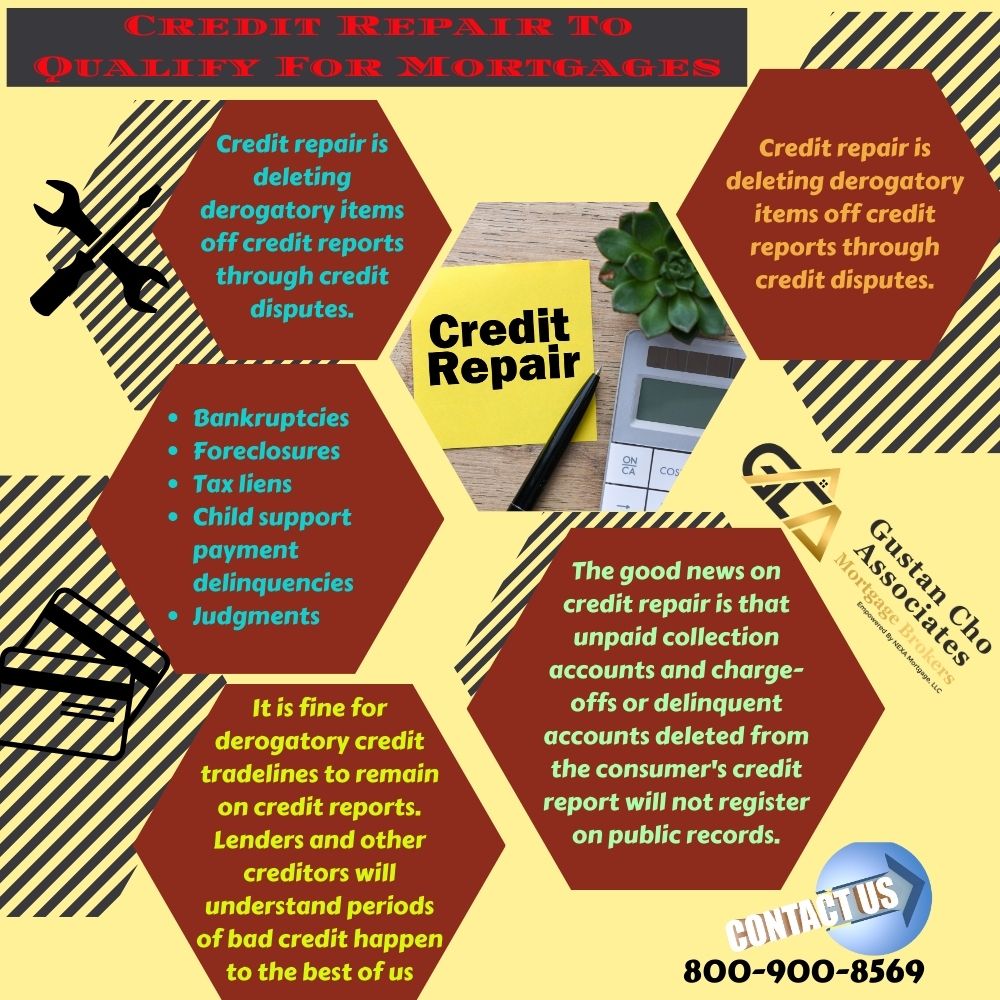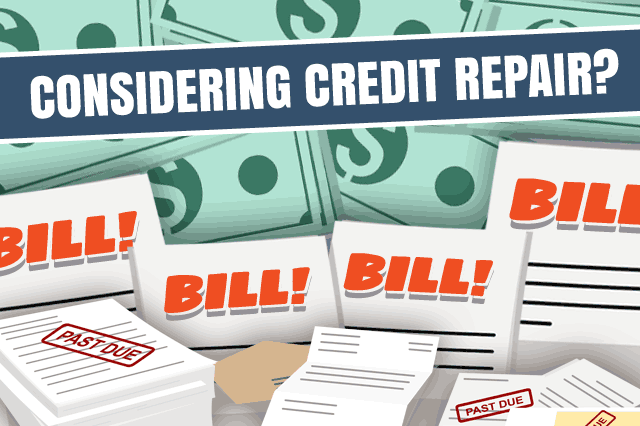In this article, “Credit Repair for Homebuyers: Preparing for a Mortgage,” you will learn valuable information and steps to take in order to repair your credit before applying for a mortgage. We will discuss the basics of credit scores and how to fix errors that may be negatively affecting your score. We will also debunk common myths surrounding credit repair and provide tips on how to build your credit and handle late payments. By the end of this article, you will have a better understanding of the necessary steps to repair your credit and increase your chances of obtaining a mortgage.
One of the important topics we will cover is the difference between credit repair and debt settlement, as well as the implications of collections and charge-offs on your credit score. We will explore the option of hiring credit repair companies versus taking a DIY approach, and offer tips for improving your creditworthiness. Whether you are a millennial seeking to repair your credit, a small business owner in need of guidance, or someone recovering from identity theft, this article will provide you with valuable strategies to navigate your credit repair journey.
Understanding Credit Scores
What is a credit score?
A credit score is a three-digit number that represents an individual’s creditworthiness. It is a numerical assessment of an individual’s credit history and is used by lenders, such as banks and mortgage companies, to evaluate the likelihood that a borrower will repay their debts. Credit scores are an essential component of the mortgage application process, as they play a significant role in determining loan eligibility and interest rates.
How credit scores are calculated
Credit scores are calculated using a variety of factors, including payment history, credit utilization, length of credit history, types of credit, and new credit applications. The most common credit scoring model is the FICO score, ranging from 300 to 850. The higher the credit score, the better the individual’s creditworthiness.
Payment history is the most critical factor in credit score calculations, accounting for approximately 35% of the overall score. It reflects whether an individual has made payments on time, has any late payments or delinquencies, or has defaulted on any loans.
Credit utilization, which accounts for about 30% of the score, is the ratio of credit card balances to credit limits. Maintaining a low credit utilization rate demonstrates responsible borrowing habits and can positively impact credit scores.
Other factors, such as the length of credit history (15%), types of credit (10%), and new credit applications (10%), also contribute to the overall credit score. A longer credit history with a mix of credit types and a minimal number of new credit inquiries can improve credit scores.
The importance of credit scores in mortgage applications
When applying for a mortgage, lenders rely heavily on credit scores to assess the borrower’s creditworthiness. A high credit score indicates a lower risk of defaulting on loan payments and can result in more favorable loan terms, such as lower interest rates and larger loan amounts.
A low credit score, on the other hand, can hinder the mortgage application process or result in higher interest rates and less favorable loan terms. It is crucial for homebuyers to understand their credit scores and take steps to improve them before applying for a mortgage to increase their chances of approval and secure the best possible loan terms.
Fixing Credit Errors
Identifying and disputing errors on credit reports
It is not uncommon for credit reports to contain errors that can negatively impact credit scores. These errors may include inaccurate personal information, incorrect account balances, or falsely reported late payments or delinquencies. Homebuyers should regularly review their credit reports for any discrepancies and take the necessary steps to dispute and correct errors.
To identify errors on credit reports, individuals should obtain copies of their reports from all three major credit bureaus – Equifax, Experian, and TransUnion. Carefully review each report, paying attention to any discrepancies or inaccuracies. If any errors are found, gather supporting documentation, such as payment receipts or account statements, to support your dispute.
To dispute errors, contact the credit bureau(s) in writing, clearly explaining the incorrect information and providing any supporting documentation. The credit bureaus are legally obligated to investigate your dispute within 30 days and make the necessary corrections if they find the information to be inaccurate.
Working with credit bureaus to correct inaccuracies
When working with credit bureaus to correct inaccuracies, it is essential to maintain detailed records of all communications and follow up regularly to ensure progress is being made on your dispute. Be persistent and patient, as the process can take time. It is also advisable to send dispute letters via certified mail with a return receipt to ensure documentation of your dispute.
If the credit bureau(s) do not correct the errors or fail to respond within the specified time frame, you may need to escalate your dispute by lodging a complaint with the Consumer Financial Protection Bureau (CFPB) or seeking legal assistance.
Correcting credit report errors can significantly improve credit scores and increase the likelihood of mortgage approval with better loan terms. Taking proactive steps to address any inaccuracies is essential for homebuyers looking to repair their credit and secure a mortgage.

This image is property of b9v9j8r7.rocketcdn.me.
Debunking Credit Repair Myths
Common misconceptions about credit repair
There are many misconceptions and myths surrounding credit repair that can lead to confusion and hinder individuals’ progress towards improving their credit scores. It is essential to debunk these myths and understand the truth behind credit repair to make informed decisions and take effective action.
One common myth is that credit repair is illegal or unethical. In reality, credit repair is a legitimate process that allows individuals to dispute inaccurate or unverifiable information on their credit reports. The Fair Credit Reporting Act (FCRA) grants consumers the right to challenge any information they believe to be inaccurate, incomplete, or outdated.
Another myth is that credit repair companies have special powers or secret methods to remove negative information from credit reports. While credit repair companies can assist individuals in navigating the credit repair process, they cannot guarantee results or remove accurate information from credit reports.
Separating fact from fiction
It is crucial to separate fact from fiction when it comes to credit repair. The truth is that individuals have the right to dispute any inaccurate or unverified information on their credit reports. This means that if there are errors, inconsistencies, or outdated information on your credit reports, you can take action to have them corrected or removed.
Credit repair requires time, effort, and patience. It involves reviewing credit reports, identifying errors, and working with credit bureaus to correct inaccuracies. While it is possible to undertake credit repair on your own, some individuals may choose to seek assistance from reputable credit repair companies for guidance and support throughout the process.
It is important to note that not all credit repair companies are created equal. Some companies may make false promises or engage in unethical practices. Therefore, it is essential to research and choose a reputable credit repair company that has a proven track record of success and follows the guidelines set forth by the Credit Repair Organizations Act (CROA).
By separating fact from fiction and understanding the truth about credit repair, homebuyers can make informed decisions and take effective steps towards improving their credit and preparing for a mortgage.
Building and Improving Credit
Establishing a positive credit history
Building and establishing a positive credit history is essential for homebuyers looking to improve their credit scores and obtain favorable mortgage terms. Here are some strategies to help individuals build a strong credit foundation:
-
Open a credit card: If you do not already have one, consider opening a credit card to establish a credit history. Start with a secured credit card or a card with a low credit limit to minimize risk.
-
Make timely payments: Pay all bills, including credit card bills, utility bills, and loan payments, on time. Late payments can negatively impact credit scores.
-
Keep credit utilization low: Utilize credit responsibly by keeping credit card balances low in comparison to credit limits. Aim to keep your credit utilization rate below 30%.
-
Maintain a mix of credit types: Having a mix of credit types, such as credit cards, installment loans, and mortgage loans, can positively impact credit scores. However, it is essential to manage these accounts responsibly.
Utilizing credit responsibly
Once a positive credit history is established, it is crucial to continue utilizing credit responsibly to maintain or improve credit scores. Here are some tips for using credit wisely:
-
Pay bills on time: Consistently make payments on or before their due dates to avoid late payment penalties and negative impacts on credit scores.
-
Keep credit utilization low: Aim to keep credit card balances well below their credit limits. High credit utilization can negatively impact credit scores.
-
Avoid opening too many new accounts: Opening multiple new credit accounts within a short period can raise concerns for potential lenders and result in a temporary decrease in credit scores.
-
Regularly review credit reports: Periodically review your credit reports for any errors or inaccuracies. Promptly address any discrepancies to maintain a positive credit history.
Tips for boosting credit scores
Boosting credit scores requires consistent effort and responsible credit management. Here are some additional tips to help homebuyers improve their credit scores:
-
Pay down debts: Reduce outstanding debts by making regular payments and paying more than the minimum required amount when possible.
-
Dispute errors: As mentioned earlier, regularly review credit reports and dispute any errors or inaccuracies promptly.
-
Consider credit utilization: While maintaining a low credit utilization rate is important, utilizing some credit is necessary to build and improve credit scores. Aim for a healthy balance between credit utilization and responsible credit management.
-
Avoid closing accounts: Closing credit accounts can impact credit utilization ratios and potentially lower credit scores. Instead of closing accounts, consider keeping older accounts open and using them sporadically to maintain a positive credit history.
By following these strategies and tips for building and improving credit, homebuyers can increase their creditworthiness and improve their chances of securing a favorable mortgage.

This image is property of i.ytimg.com.
Dealing with Late Payments
The impact of late payments on credit scores
Late payments have a significant negative impact on credit scores and can remain on credit reports for up to seven years. The severity of the impact depends on factors such as the delinquency’s recency, frequency, and the magnitude of the late payments.
A single late payment can cause a significant drop in credit scores, especially for individuals with previously excellent credit. Multiple late payments or a pattern of delinquencies can further damage credit scores and make it challenging to obtain credit or secure favorable loan terms.
Strategies for catching up on overdue payments
If you find yourself in a situation where you have overdue payments, it is essential to take action promptly to minimize the impact on your credit scores. Here are some strategies to help you catch up on overdue payments:
-
Prioritize payments: Assess your financial situation and prioritize payments based on the severity of delinquency and potential consequences of non-payment. Focus on making payments for essential expenses, such as mortgage or rent, utilities, and food.
-
Communicate with creditors: Reach out to your creditors to explain your situation and explore potential options for repayment or temporary hardship programs. Many creditors are willing to work with individuals facing financial difficulties and may offer flexible repayment plans or temporarily lower interest rates.
-
Set up payment reminders: Utilize technology to your advantage by setting up payment reminders or automatic bill payments. This can help ensure that you do not miss any future payments and prevent further late payment issues.
-
Budget and reduce expenses: Evaluate your expenses and identify areas where you can make adjustments to allocate more funds towards catching up on late payments. Consider cutting back on non-essential expenses or finding ways to generate additional income.
By taking proactive steps to catch up on overdue payments and communicate with creditors, individuals can mitigate the negative impact of late payments on their credit scores and improve their overall financial situation.
Credit Repair vs. Debt Settlement
Understanding the differences between credit repair and debt settlement
Credit repair and debt settlement are two distinct approaches to managing and improving one’s financial situation. Understanding the differences between them is essential for homebuyers seeking to prepare for a mortgage.
Credit repair focuses on addressing inaccuracies and errors on credit reports to improve credit scores. The goal is to remove any negative information that is incorrectly reported, such as late payments or delinquencies, and ensure that credit reports reflect accurate and up-to-date information. Credit repair involves reviewing credit reports, disputing errors, and working with credit bureaus to correct inaccuracies.
Debt settlement, on the other hand, is the process of negotiating with creditors to reduce the amount owed or to establish a repayment plan that is more manageable for the debtor. Debt settlement typically applies to accounts that are in collections or delinquent and aims to settle outstanding debts for less than the full amount owed. Debt settlement can result in significant reductions in debt balances, but it can also have a negative impact on credit scores.
Choosing the right approach for financial goals
Choosing the right approach between credit repair and debt settlement depends on the individual’s specific financial goals and circumstances. For homebuyers preparing for a mortgage, credit repair is typically the more suitable option.
Improving credit scores through credit repair can increase the likelihood of mortgage approval and result in more favorable loan terms. By addressing inaccuracies and errors on credit reports, individuals can present a more accurate representation of their creditworthiness to potential lenders.
Debt settlement, while it can reduce outstanding debt balances, can have a negative impact on credit scores and may not be the best option for individuals seeking a mortgage. Lenders typically view settlement arrangements as a sign of financial distress and may be hesitant to approve a loan or offer favorable terms.
It is important to consult with financial advisors or credit professionals to determine the best course of action based on individual circumstances. They can provide guidance on the most appropriate approach to achieving financial goals and preparing for a mortgage.

This image is property of 97a71502eb772ee741d5-eec37cd46b952dd4b9d7b7ed972b68c1.ssl.cf1.rackcdn.com.
Handling Collections and Charge-offs
Navigating the process of dealing with collections and charge-offs
Collections and charge-offs are serious derogatory marks on credit reports that can significantly impact credit scores and hinder mortgage approval. It is essential for homebuyers to understand how to navigate the process of dealing with collections and charge-offs to minimize their negative impact.
When an account becomes delinquent for an extended period, creditors may charge off the debt and transfer it to a collections agency. The collections agency then attempts to collect the debt on behalf of the original creditor. This process can result in significant damage to credit scores.
To handle collections and charge-offs effectively, consider the following steps:
-
Review and verify the debt: Request a validation of the debt from the collections agency to ensure its accuracy and legitimacy. The collections agency must provide documentation verifying that the debt is valid.
-
Negotiate a settlement: If the debt is valid, consider negotiating a settlement with the collections agency. Offer a lump-sum payment or a payment plan that is acceptable to both parties. Be sure to get any settlement agreements in writing before making any payments.
-
Pay off the debt: Once a settlement is reached, make the agreed-upon payment promptly. Ensure that the collections agency updates the credit report accordingly to reflect the settled or paid-off status.
-
Monitor credit reports: Regularly monitor your credit reports to ensure that collections accounts are accurately reported. Dispute any errors or inaccuracies promptly to maintain the integrity of your credit history.
It is worth noting that settling or paying off collections and charge-offs may not immediately improve credit scores. However, it demonstrates responsible financial behavior and can help rebuild credit over time.
Options for resolving these issues
When faced with collections and charge-offs, homebuyers have several options for resolving these issues and minimizing their impact on credit scores:
-
Pay off the debt in full: If financially feasible, consider paying off the debt in full. This demonstrates responsible financial behavior and may improve credit scores over time.
-
Negotiate a settlement: If paying off the debt in full is not possible, consider negotiating a settlement with the collections agency. Offer a percentage of the total amount owed as a lump-sum payment or propose a manageable payment plan.
-
Verify the debt: Request verification of the debt from the collections agency to ensure its accuracy and legitimacy. If the agency fails to provide proper validation, you may be able to dispute and have the debt removed from your credit report.
-
Create a payment plan: If negotiating a settlement is not an option, consider working with the collections agency to establish a payment plan. Make regular, on-time payments to gradually pay off the debt.
By taking action and proactively addressing collections and charge-offs, homebuyers can show their commitment to improving their financial standing and increase their chances of mortgage approval.
Navigating the Credit Repair Industry
Evaluating the pros and cons of hiring credit repair companies
When considering credit repair, individuals may choose to hire credit repair companies to assist them in the process. While credit repair companies can provide guidance and support, it is important to evaluate the pros and cons before making a decision.
Pros of hiring credit repair companies include:
-
Expertise and experience: Credit repair companies have specialized knowledge and experience in navigating the credit repair process. They can provide guidance on disputing errors, negotiating with creditors, and improving credit scores.
-
Time-saving: Credit repair can be a lengthy and time-consuming process. Hiring a credit repair company can save time and effort, as they can handle the majority of the work on behalf of the individual.
-
Support and guidance: Credit repair companies can provide ongoing support and guidance throughout the credit repair journey. They can answer questions, address concerns, and provide personalized advice based on individual circumstances.
Cons of hiring credit repair companies include:
-
Cost: Credit repair companies typically charge fees for their services. The cost can vary depending on the company and the level of assistance required.
-
Lack of control: By hiring a credit repair company, individuals relinquish some control over the credit repair process. They must trust the company to act in their best interests and effectively resolve credit issues.
-
Variable results: Although credit repair companies can help individuals improve their credit scores, there are no guarantees of specific outcomes. Each case is unique, and results may vary depending on the individual’s credit history and circumstances.
Tips for identifying reputable companies
If individuals decide to hire a credit repair company, it is crucial to choose a reputable and trustworthy organization. Here are some tips for identifying reputable credit repair companies:
-
Research and reviews: Conduct thorough research on the company’s background, history, and track record. Read reviews and testimonials from previous clients to gauge their level of customer satisfaction.
-
Regulatory compliance: Ensure that the credit repair company complies with all applicable laws and regulations, such as the Credit Repair Organizations Act (CROA). Avoid companies that make false promises or engage in illegal or unethical practices.
-
Clear communication and transparency: Look for credit repair companies that provide clear and transparent information about their services, fees, and the expected timeline for results. Avoid companies that use high-pressure sales tactics or make guarantees of specific outcomes.
-
Professional credentials: Check if the credit repair company has professional credentials, certifications, or affiliations with reputable organizations in the credit repair industry. This can indicate their commitment to ethical standards and the quality of their services.
By carefully evaluating credit repair companies and selecting a reputable organization, individuals can ensure that they receive reliable guidance and support throughout the credit repair process.

This image is property of mercersavings.com.
DIY Credit Repair Tips
Effective strategies for repairing credit on your own
Credit repair can be undertaken independently, allowing individuals to take control of their credit repair journey and save on potential fees associated with hiring a credit repair company. Here are some effective strategies for repairing credit on your own:
-
Obtain and review credit reports: Start by obtaining copies of your credit reports from all three major credit bureaus – Equifax, Experian, and TransUnion. Review each report carefully, noting any inaccuracies, errors, or outdated information.
-
Dispute errors and inaccuracies: Once errors or inaccuracies are identified, dispute them with the credit bureaus. Send a detailed letter explaining the inaccurate information and include any supporting documentation. The credit bureaus are legally obligated to investigate your dispute and correct any errors they find within 30 days.
-
Communicate with creditors: Reach out to your creditors to address any outstanding debts, late payments, or delinquencies. In some cases, creditors may be willing to remove negative information from your credit reports or work out a settlement agreement.
-
Establish positive credit habits: Commit to responsible credit management by making payments on time, keeping credit card balances low, and avoiding new credit inquiries unless necessary. Establishing positive credit habits can gradually improve credit scores over time.
-
Create a budget: Develop a comprehensive budget that allows you to allocate funds towards paying off outstanding debts and meeting financial obligations. Prioritize essential expenses and consider cutting back on non-essential spending to free up more funds for debt repayment.
-
Track progress and monitor credit reports: Regularly review your credit reports to track your progress and ensure that corrections have been made. Monitor your credit scores and take note of any changes or fluctuations.
-
Patience and perseverance: Credit repair is not an overnight process. It requires patience and perseverance. Stay committed to your credit repair goals and continue implementing responsible credit habits. Over time, you will see improvements in your credit scores.
Resources and tools for DIY credit repair
Several resources and tools can assist individuals in their DIY credit repair efforts. Here are some helpful resources to consider:
-
AnnualCreditReport.com: This website allows individuals to access their free credit reports from all three major credit bureaus once every 12 months. Reviewing your credit reports can help identify errors or inaccuracies.
-
Credit monitoring services: Consider enrolling in a credit monitoring service that provides regular updates on changes to your credit reports and credit scores. This can help you stay informed about your credit standing and any potential fraud or identity theft issues.
-
Credit counseling agencies: Non-profit credit counseling agencies provide free or low-cost services to help individuals with credit repair, budgeting, and debt management. These agencies can provide personalized guidance and support throughout the credit repair journey.
-
DIY credit repair kits and guides: There are many DIY credit repair kits and guides available online or in bookstores. These resources provide step-by-step instructions, template letters for dispute, and valuable tips for repairing credit independently.
By utilizing these resources and tools, individuals can effectively undertake DIY credit repair and take control of their credit improvement journey.
Conclusion
In conclusion, credit repair is a crucial step for homebuyers preparing for a mortgage. Understanding credit scores, disputing errors on credit reports, debunking credit repair myths, and implementing strategies to build and improve credit are essential elements of credit repair.
By prioritizing timely payments, maintaining a low credit utilization ratio, and responsibly managing credit, individuals can gradually boost their credit scores and increase their chances of securing a favorable mortgage. It is important to differentiate between credit repair and debt settlement, choosing the approach that aligns with one’s financial goals.
Whether individuals decide to hire a reputable credit repair company or embark on DIY credit repair, it is essential to be proactive, patient, and persistent throughout the process. By diligently addressing collections, charge-offs, and late payments, individuals can repair their credit and position themselves for successful homeownership.
Empowered with knowledge and armed with effective credit repair strategies, homebuyers can take control of their credit repair journey and achieve their dream of homeownership. Start today and pave the way for a brighter financial future.

This image is property of i.ytimg.com.
